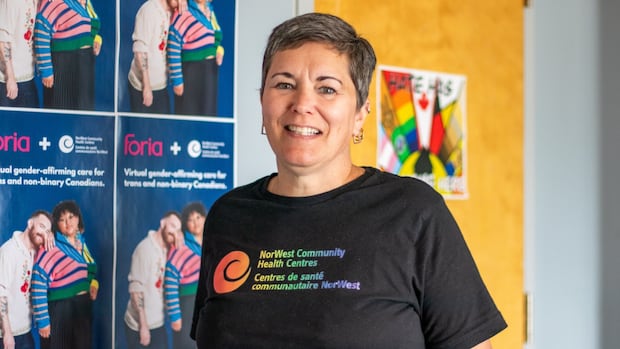A program that offers free, virtual gender-affirming care to patients in northwestern Ontario has expanded to provide more mental health services.
NorWest Community Health Centres (NWCHC), based in Thunder Bay, Ont., partnered with Foria Clinic just over a year ago. The clinic provides virtual hormone appointments and surgery referrals, and recently added psychotherapy and voice training, for members of the region’s 2SLGBTQ+ community.
Foria Clinic was born out of the Connect-Clinic, which served people in rural communities virtually with support from several physicians.
However, changes to the provincial funding formula in 2022 meant physicians could no longer bill full codes for virtual care. As a result, Connect-Clinic could no longer afford to stay open.
After that, the clinic’s founder, Dr. Kate Greenaway, connected with PurposeMed to open Foria Clinic in 2023.
“We originally launched as a patient pay service in Ontario because we were using nurse practitioners and we could not bill physician services anymore,” said Greenaway, Foria Clinic’s medical director.
 People can go to Foria Clinic’s website to sign up for virtual gender-affirming care services. (Sarah Law/CBC)
People can go to Foria Clinic’s website to sign up for virtual gender-affirming care services. (Sarah Law/CBC)
However, she didn’t want to make patients pay, given the fact that transgender and non-binary people face higher rates of poverty than their cisgender counterparts.
“We have a population that is underserved medically, also economically marginalized, and yet we’re doing a patient pay service really out of necessity if I was going to continue to offer the care I’ve been doing,” Greenaway said.
With funding through NWCHC, Foria Clinic is able to offer its services to northwestern Ontario residents at no cost. Its programs are also free in Alberta, which fully reimburses doctors for virtual visits.
Elsewhere in Ontario, patients must pay $299 for an initial consultation, with other appointments ranging in price from $99 to $199.
Lisa Long, NWCHC’s manager of allied health and social programs, told CBC News the organization has funding to continue its partnership with Foria Clinic until the end of March 2026. After that, “it’ll depend on funding.”
‘Gender-affirming care is life-saving care’
Virtual services help bridge gaps in care in geographically-diverse areas, said Greenaway, particularly in northwestern Ontario where communities are so spread apart.
It also creates a safe option for patients who may have had negative experiences in the past in medical settings or who don’t feel comfortable approaching their primary care provider for these services.
Dr. Kate Greenaway is a family physician and medical director of Foria Clinic. (Submitted by Kate Greenaway)
“When you have the virtual care option that is dedicated to gender-affirming care, people feel safe to join the meeting because they know the provider is competent, culturally competent and trained and is going to be able to answer their questions,” Greenaway said.
“I think there’s also that element of safety and just reassurance that folks are not going to be experiencing any transphobia or discrimination through using a virtual service this way.”
About three in 10 2SLGBTQ+ people surveyed by Statistics Canada reported their mental health to be fair or poor, compared to one in 10 non-2SLGBTQ+ individuals.
The recent addition of psychotherapy services through Foria Clinic aims to address these challenges, said Long.
“Safety, accessibility, removing barriers to service, that’s what we want to do,” Long said. “It’s very safe and if you don’t feel comfortable going through your own provider, this is a fabulous option.”
NWCHC and Foria Clinic are actively seeking new patients in the region. People can self-refer by going to Foria Clinic’s website. In order to access services for free, they must provide a northwestern Ontario postal code.
“Gender-affirming care is life-saving care,” Greenaway said. “We’ve seen the impact it has on people’s lives and how it allows folks to thrive and be present in their lives without worrying about where they’re going to get health care or these really essential medical interventions that they require for their transition.”

